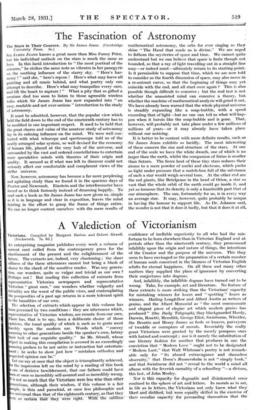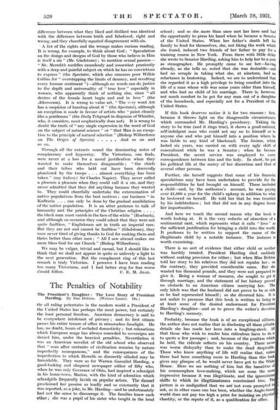A Valediction of Victorianism
Victoriana. Compiled by Margaret Barton and Osbert Sitwell. (Duckworth. 78.
Ax enterprising magazine publishes every week a column of current cant culled from the contemporary press for the chastisement of the present and the enlightemnen1 of the future. The extracts are, indeed, very chastening ; the sheer silliness of the these utterances cannot but bring a blush of shame to the cheek of the sensitive reader. Was any genera- tion, one wonders, quite so vulgar and trivial as our own ? Perhaps not ! But reading this collection of extracts from representative Victorian newspapers and representative Victorian "great men," one wonders whether vulgarity and triviality are the worst of the public vices, and contemplating the pomposities of a past age returns in a more, tolerant spirit to the banalities of our own.
The selection of extracts which appear in this volume has been governed by two conditions : they are utterances which, representative of Victorian wisdom, are remote from our own. There has, that is to say, been a deliberate choice of those Opinions, the tonal quality of which is such as to grate most iarshly upon the modern ear. Words which "convey neaning to other generations beside the speaker's own, betray heir lack of our requisite quality." So Mr. Sitwell, whose bject in making this compilation is avowed in an exceedingly musing preface to be not satire or instruction but entertain- ent ; he seeks to show just how "mistaken orthodox and peeled opinion can be."
Let me say at once that the object is triumphantly achieved, r the impression left on the mind by a reading of this book One of derisive bewilderment, that our fathers could have n at once so incredibly self-assured and so incredibly wrong. t is not so much that the Victorians were less wise than other enerations, although their wisdom, if this volume is a fair mple, is thin and parochial, at once less philosophic and universal than that of the eighteenth century, as that they ere so. Certain thilt. they were right.— Withnfie.subltme
confidence of ineffable superiority to all who had the mis- fortune to be born elsewhere than in Victorian England and at periods other than the nineteenth century, they pronounced infallibly upon the origin and nature of things, the intentions of the Creator and the purpose of the universe. This they seem to have envisaged as the preparation of a certain number Of human souls conceived in the likeness of Victorian English adults for eternal happiness. On all these and many other matters they supplied the place of ignorance by converting their conjectures into dogmas.
And, infallibly, the infallible dogmas have turned out to be wrong. Take, for example, art and literature. No feature of these extracts is more striking than the Victorians' capacity for mistaking winners for losers and " spotting " losers as winners. Hailing Longfellow and Alfred Austin as writers of genius, and the Albert Memorial as "the most consummate and elegant piece of elegiac art which modern genius has produced" (the Daily Telegraph), they blackguarded Hardy, Darwin, Rosetti, Meredith, George Eliot, Swinburne, Whistler, the Brontës and Henry James as fools or knaves, purveyors of twaddle or corrupters of morals. Invariably the really great Victorians were greeted by the merely pompous ones with hatred and contempt ; nor is it merely the substitution of one literary fashion for another that produces in one the conviction that "Modern Love" ought not to be designated Modern Lust," that Walt Whitman's poetry is not remark- able only for "its absurd extravagance and shameless obscenity," that Ibsen's Rosmersholm is not "simply bosh," and that Swinburne did not "reveal to the world a mind all aflame with the feverish carnality of a schoolboy "—a dictum, this last, of John Morley.
Nor is this capacity for dogmatic and disinterested error confined to the sphere of art and letters. In morals as in art, in life as in letters, the Victorians not only . knew, what they liked tifiddialiked; hitt. were equally: skilled in the exercise of -their neetdiar capacity fcir persuading themselves that the
difference between what they liked and disliked was identical with the difference between truth and falsehood, right and wrong, and they cheerfully equated disagreement with sin.
- A list of the rights and the wrongs makes curious reading. It is wrong, for example, to think about God ; "Speculation on the doings and designs of God by those who believe in Him is itself a sin" (Mr. Gladstone) ; to mention sexual passion- " Mr. Meredith meddles causelessly and somewhat pruriently with a deep and painful subject on which he has no convictions to express" (the Spectator, which also censures poor Wilkie 'Collins for "overstepping the limits of decency, and revolting every human sentiment ")—although no words can do justice to the depth and universality of "true love" especially in women, who apparently think of nothing else, since "all desires of the female heart begin and end in love" (the Athenaeum). It is wrong to value art, "The very word Art has a suspicion of humbug about it" (the Spectator), although an exception is made in favour of artists who "paint cleanly like a gentleman" (the Daily Telegraph in dispraise of Whistler, who, it considers, most emphatically does not). It is wrong to doubt the truth of " any single expression in the word of God on the subject of natural science" or "that Man is an excep- tion to the principle of natural selection" (Bishop Wilberforce on The Origin of Species) . . . . . And so on and so on.
Through all the extracts sound the dominating notes of complacency and hypocrisy. The Victorians, one finds, were never at a loss for a moral justification when they wanted to make themselves disagreeable ; " the chiefs and their tribes who held out have been deservedly plundered by the troops . . . almost everything has been taken" (my italics) ( Sir Charles Napier). They never called a pleasure a pleasure when they could call it a sin, and they never admitted that they did anything because they wanted to. They could cheerfully undertake the extermination of native populations from the best motives ; our business "in Ka ffraria . . . can only be done by the gradual annihilation of the native population. It is an utter pretence to talk of humanity and the principles of the Christian religion . . . . the black man must vanish in the face of the white " (Roebuck), and although on occasion they could admit that they were not quite faultless, "Englishmen are in truth an imperial race. But they are not and cannot be faultless" (Gladstone), they were never tired of giving thanks to God for making them and theirs better than other men ; "All I saw abroad makes me more bless God for our Church" (Bishop Wilberforce).
We may be vulgar, trivial and casual, but I should like to think that we shall not appear in quite so unlovely a light to the next generation. But the complacent ring of this last remark is truly Victorian. I perceive I have been reading too many Victoriana, and I had better stop for fear worse















































 Previous page
Previous page